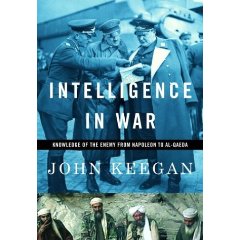New Comment: America is mired in Iraq today because US and UK intelligence lacked integrity and failed to publicly challenge the constant lies of Bush, Cheney, and Blair. I have made it my personal goal to reduce the US secret intelligence budget by 80%, to $12 billion a year, within ten years. The UK should consider doing the same.
I feel so strongly about the misdirection of this book, its eminent author not-withstanding, that I actually did a press release responding to the early publicity. I hope you find it interesting, because we will lose many more lives and pay much migher costs in damages if we fail to reform national, military, and law enforcement intelligence at the strategic, operational, tactical, and technical levels. Send me an email if you would like to have a list of 20 really great books on intelligence.
FORMER SPY AND NATIONAL SECURITY EXPERT RESPONDS TO SIR JOHN KEEGAN'S NEW BOOK TO THE EFFECT THAT INTELLIGENCE DOES NOT WIN WARS
Washington, D.C., October 23/PRNEWSWIRE/ — Robert David Steele, a former spy and founder of the Marine Corps Intelligence Command, applauds Sir John Keegan's commentary “Forget about James Bond -intelligence never wins wars” as filed on 22/10/2003. However, Steele says, “As a long-time admirer of Sir John's prowess in understanding warfare, I must respectfully say that in this instance, he stands with the American Colonel who plaintively observed to the North Vietnamese Colonel that America won all the battles in Viet-Nam-to which the man replied, as recounted by Harry Summers, with (and I paraphrase), `So what? That is irrelevant to the outcome.'”
Steele goes on, “Where Sir John misses the point is with respect to the distinct role of intelligence at the strategic level. As Sun Tsu (and perhaps even Colin Gray) would no doubt observe to Sir John, `If you've gotten yourself into a war at all, then you have failed to win by other means, and it is this that is the larger intelligence failure.'”
Steele concludes, “It is my own experience that 80% of the American national security budget is wastefully expended on a heavy metal military that is useless 90% of the time. Indeed, of the $500 billion a year we spend today, we should reduce the amount spent on conventional and nuclear forces by half, while re-directing the savings toward special operations, gendarme, peace, and homeland security intelligence and counterintelligence. America has begun a hundred-year war on six different fronts precisely because the President lacked intelligence in every sense of the word, and because he and his ideologically-motivated handlers also lacked the kind of long-term diverse strategy for securing a sustainable long-term peace that can only come from a full understanding of diverse threats and circumstances. Yes, soldiers win wars. Intelligence professionals prevent wars by being prescient, clever, and covertly effective.”
Mr. Steele is the author of On Intelligence: Spies and Secrecy in an Open World (2001); The New Craft of Intelligence: Personal, Public, & Political–Citizen's Action Handbook for Fighting Terrorism, Genocide, Disease, Toxic Bombs, & Corruption (2002); Information Operations: All Information, All Languages, All the Time; and THE SMART NATION ACT: Public Intelligence in the Public Interest; and a contributing editor of Peacekeeping Intelligence: Emerging Concepts for the Future (2003). All can be purchased at Amazon.
In 2008 I will publish the following titles, each them the epitaph of the secret intelligence and heavy metal military worlds:
COLLECTIVE INTELLIGENCE: Creating a Prosperous World at Peace (edited)
PEACE INTELLIGENCE: Assuring a Good Life for All (edited)
COMMERCIAL INTELLIGENCE: From Moral Green to Golden Peace (edited)
WAR & PEACE: The Seventh Generation
Five great books on intelligence:
Intelligence Power in Peace and War
Strategic Intelligence & Statecraft: Selected Essays (Brassey's Intelligence and National Security Library)
Who the Hell Are We Fighting?: The Story of Sam Adams and the Vietnam Intelligence Wars
None So Blind: A Personal Account of the Intelligence Failure in Vietnam
Legacy of Ashes: The History of the CIA
My two seminal chapters, one on strategic open source intelligence, the other on operational open source intelligence, are free on online at OSS.Net/OSINT-S and OSS.Net/OSINT-O. Just insert the three w's.




